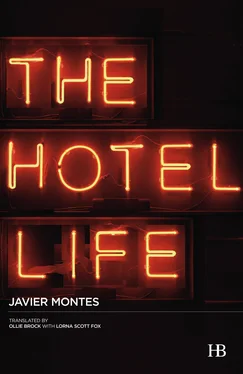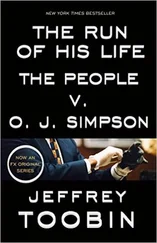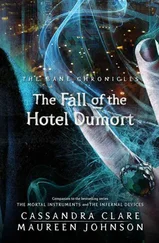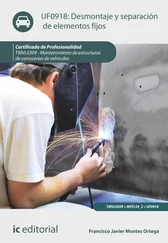Javier Montes - The Hotel Life
Здесь есть возможность читать онлайн «Javier Montes - The Hotel Life» весь текст электронной книги совершенно бесплатно (целиком полную версию без сокращений). В некоторых случаях можно слушать аудио, скачать через торрент в формате fb2 и присутствует краткое содержание. Год выпуска: 2013, Издательство: Hispabooks, Жанр: Современная проза, на английском языке. Описание произведения, (предисловие) а так же отзывы посетителей доступны на портале библиотеки ЛибКат.
- Название:The Hotel Life
- Автор:
- Издательство:Hispabooks
- Жанр:
- Год:2013
- ISBN:нет данных
- Рейтинг книги:3 / 5. Голосов: 1
-
Избранное:Добавить в избранное
- Отзывы:
-
Ваша оценка:
- 60
- 1
- 2
- 3
- 4
- 5
The Hotel Life: краткое содержание, описание и аннотация
Предлагаем к чтению аннотацию, описание, краткое содержание или предисловие (зависит от того, что написал сам автор книги «The Hotel Life»). Если вы не нашли необходимую информацию о книге — напишите в комментариях, мы постараемся отыскать её.
The Hotel Life — читать онлайн бесплатно полную книгу (весь текст) целиком
Ниже представлен текст книги, разбитый по страницам. Система сохранения места последней прочитанной страницы, позволяет с удобством читать онлайн бесплатно книгу «The Hotel Life», без необходимости каждый раз заново искать на чём Вы остановились. Поставьте закладку, и сможете в любой момент перейти на страницу, на которой закончили чтение.
Интервал:
Закладка:
My colleague talked on. But eschewing further explanations, he was now applying for my help.
“I was on my way to bed, but I’ve got to check the kitchens first.”
He was acquainted with them already from previous visits, but during the welcome dinner the hotel manager announced that they had been re-outfitted prior to this year’s contest. The manager had promised to show him around, but worrying news had arrived to prevent their tour: down in the city, apparently, a rash of catering-industry strikes had broken out and was now threatening to scale the slopes and infect the ski resorts. And this was an important award, a triennial Nobel Prize, practically, for restaurateurs. Tomorrow, the competing chefs would be arriving from all over the world, and they could be maddeningly persnickety people. He felt bound to make sure that everything was shipshape.
“I was going to get someone from the staff to help, but I’d be grateful if you could do it. With this chair, the occasional step or door can become an impassable barrier.”
The timing was so heaven-sent, the proposition was so detailed, and it sounded so innocent that I assented nervously. I looked the man straight in the face and saw nothing but a frankness that was sufficiently unlike him to make me uneasy. And I’d never heard him refer to his paralysis as a handicap before. I’d never heard him mention it at all, in fact. As for the impassable barriers, that phrase rang a bell; I seem to remember it coming from some government-sponsored public awareness campaign.
Maybe the request for help was a veiled offer of the same. And elegantly contrived, at that: nobody’s going to deny anything to a person with a disability. Here was a chance to escape from old Pedro in a way that would also spare the remnants of my much-battered dignity. I jumped at it.
“Let’s go then.”
He accepted my acceptance without ceremony. He didn’t stretch his good manners — if that’s what they were — so far as to thank me. He said nothing as he headed toward the farthest corner of the lobby, directly opposite where old Pedro was still hovering in the shadows with his newspaper. I followed the chair, not looking back; I didn’t have to look to know that he was tracking us with his eyes. My colleague pushed open a hidden door in the wood paneling along the back wall. A sign beside it read: No Entry. Authorized Personnel Only .
“Not to worry. That’s us.”
As chairman of the judge’s panel, he had been given carte blanche to go anywhere he pleased on the premises. I went in, hoping that the notice would prove an impassable barrier for old Pedro.
Beyond the door, it was goodbye to fine hardwood and soft luxury lighting. Neon tubes buzzed on the ceiling, and there was a massive freight elevator at the end of the whitewashed passageway. It wouldn’t open until I inserted a special key my guide produced from his pocket.
“You see? It’s a good thing you’re here for this sort of thing.”
I didn’t reply. The lock wasn’t that high, and he could have managed. I was reminded of the identical key it had been necessary to obtain in order to get up to the roof of the Imperial. Now it was facilitating a reverse journey. We were on Level 0; my guide pressed –3.
“OK, here we go.”
Once more, the man was smiling with nothing but his lips, so I avoided his eyes as we went down. I didn’t get the impression he was trying to catch mine, either; he sat in silence, staring absently at the doors. The big elevator took ages to go down. If it was going down — it went so slowly that the only sensation of progress came from the digital numbers on the panel. We eased downwards without a single jolt, accompanied by only the faintest of vibrations. When the automatic doors finally opened, they whipped aside like a magician’s curtains, finally unveiling the box run through with swords.
My heart sank, as though the trick had failed. We stood before a passageway that was identical in every respect: same whitewashed walls, same neon lights. Here, though, their buzz was drowned out by a muffled, mechanical chugging that got louder as soon as the critic opened a door on the right. He had to shout to make himself heard.
“Let’s cut through here to the kitchens.”
We passed through the vast boiler room. It was brilliantly lit, a flat glare reflecting off the shiny housings along the walls. The very paucity of buttons and lights on them suggested that each one must be critically important. Obviously, pressing anything could have life-or-death consequences. Even a layman like myself — especially a layman like myself — was bound to feel alarmed at the potential for a devastating explosion.
This impression of imminent threat was not dispelled by the color scheme chosen for the machine casings. It was meant to be soothing, but the effect was as sinister as the malevolent throbbing it tried to conceal. The beige hiss, the ochre rattle, the hospital-green clicks of the mechanical hearts that kept the hotel alive — the two hundred radiators in the bedrooms far above, the water pumps, the emergency generators, the air-conditioning units. The place smelled of electricity, of metal and dust, of the black grease that oozed from some of the joints and gleamed ominously on the bolts poking like claws through the camouflage of the enameled exteriors. I thought back to the little hut that hid the softly whirring pulleys on the roof of my parents’ building.
I took in all of this in passing as I hurried to keep up with my guide’s wheelchair. The door out of the boiler room led, contrastingly, into a windowless box where someone had tried to create a habitable, almost cozy environment. It was furnished with sunken couches, wobbly tables, and rickety chairs that must have been salvaged from several successive eras of hotel décor. A banner wishing a happy 2001, some poisonous tinsel, games of chess, checkers, Parcheesi, and Chutes and Ladders — complete with shaker cups and dice — plus some Alpine waterfall posters; all this lent the whole scene the pitiful air of an attempt at domesticity. A brightly colored sign identified this as the Recreation Room. It smelled the same as the boiler room.
The critic swiveled around and we looked at each other.
“What do you think?”
I smiled lamely, to make up for my inability to find anything at all to say. He smiled, too, but not, I felt, with that edge of irony or superciliousness — and still less of mockery — that I would have expected of him and would have welcomed right then. He really seemed to be taking the room’s failed attempts at homeliness seriously. Anyone would think it had been he, rather than some director of human resources or employee of the month, who had been in charge of furnishing the space. And now his smile was suddenly pensive, as though this desolate room truly condensed all the debacles of the world, as though we stood at the very epicenter from which all earthly desolations spring.
It brought home to me, not for the first time, how surprising the things that jokers take seriously are. And how inopportune, too.
“I suppose this room must be a real incentive to productivity.”
I said it in a clumsy bid to imitate the jocularity at which he so excelled. He didn’t raise his head or stop smiling. Instead, a moment later his smile grew even broader and took on a markedly different quality. Although he wasn’t looking at me, I caught sight of the old, ruthless glint in his eye. I was a lot more comfortable with that, and I guess he was, too.
“Yeah. What a place for playing Parcheesi.”
He wheeled up to the Parcheesi table, where a board lay with some tokens marking a half-finished game. He picked up a dice cup and shook it thoroughly, not very hard, as if counting, one by one, the number of wrist-flicks it would take to produce the desired score.
Читать дальшеИнтервал:
Закладка:
Похожие книги на «The Hotel Life»
Представляем Вашему вниманию похожие книги на «The Hotel Life» списком для выбора. Мы отобрали схожую по названию и смыслу литературу в надежде предоставить читателям больше вариантов отыскать новые, интересные, ещё непрочитанные произведения.
Обсуждение, отзывы о книге «The Hotel Life» и просто собственные мнения читателей. Оставьте ваши комментарии, напишите, что Вы думаете о произведении, его смысле или главных героях. Укажите что конкретно понравилось, а что нет, и почему Вы так считаете.












